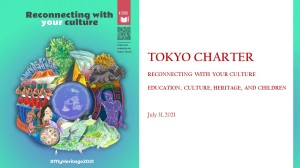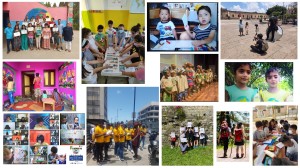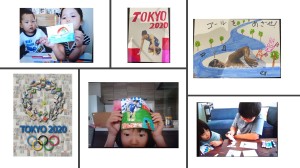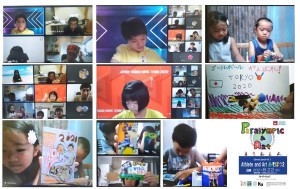Tokyo charter. Reconnecting with your culture. Education, culture, heritage, and children
Posted By Comitato di Redazione On 1 novembre 2021 @ 01:41 In Cultura,Società | No Comments
di Olimpia Niglio, D. Paul Schafer
Questa Carta sull’educazione al patrimonio culturale locale è stata messa a punto dopo intense discussioni e consultazioni con molte persone, organizzazioni e Paesi di tutto il mondo tra il 2020 e il 2021. Ha lo scopo di unire il lavoro e gli sforzi di studenti, insegnanti, famiglie e autorità accademiche in questo settore, così come di molte Istituzioni comunitarie come scuole elementari e secondarie, collegi comunitari, università, musei, associazioni e centri di ricerca.
RECONNECTING WITH YOUR CULTURE, programma pedagogico indirizzato alle scuole dell’infanzia, alle primarie e secondarie, crede che solo attraverso la conoscenza consapevole delle culture e dei patrimoni locali sarà possibile aiutare gli studenti, le giovani generazioni e le persone in generale a comprendere e ad apprezzare le proprie culture e i propri patrimoni così come quelli degli altri, attivando politiche e pratiche per un mondo sostenibile basato sulla giustizia, l’ordine, l’uguaglianza e la partecipazione attiva di tutti i cittadini e Paesi.
Raccomandiamo e sosteniamo l’impegno verso gli obiettivi dell’AGENDA 2030 DELLE NAZIONI UNITE e sottolineiamo specialmente l’importanza dell’insegnamento e dell’apprendimento delle culture e dei patrimoni a livello locale in tutto il mondo per la realizzazione degli obiettivi proposti. La Carta è stata promossa dal centro di ricerca internazionale di “Reconnecting with your culture” in collaborazione con UNESCO Università e Patrimonio. Il documento è stato presentato a Tokyo il 31 luglio 2021 in occasione delle Olimpiadi e delle Paraolimpiadi durante le quali sono stati svolti diversi seminari con associazioni culturali e scuole dell’infanzia. Dal mese di settembre la Carta è in diffusione in tutto il mondo e il 7 settembre 2021 è stata presentata anche a Bruxelles nell’ambito della Commissione della New European Bauhaus di cui “Reconnecting with your culture” è partner internazionale.
PREAMBLE
The complexities of contemporary life, the COVID-19 pandemic, racial inequalities, severe economic disparities, and many other factors confirm that it is time to put the PERSON, PEOPLE, and CREATIVITY at the center of our lives and the world at large. Moreover, the fragility of the current situation, which all countries are manifesting in their cultural, educational, and other sectors, reveals that a “new centrality” must be accorded to the role CULTURE can and should play in sustainable development and the world of the future. In fact, without culture, it is difficult to see how shared and participatory policies and practices can be created that are of crucial importance at present and going forward into the future.
Analyzing these realities and requirements in the different areas of the world from the Far East to the Far West has made it clear that a new HUMANISM is also necessary to ensure that Culture enters into all the innovative plans, procedures, and policies that are needed in the years and decades ahead.
To achieve and assure requirements as imperative as this, it is necessary to begin with children, young people, and the youthful generation. This will guarantee that the right seeds are planted, and investments made to yield fine fruits and excellent harvests in the years to come. It will also guarantee that educational courses, programs, curriculums, and policies are created and put into place to produce a better world for all people and all countries.
On July 20, 2020, the international pedagogical program and method created by RECONNECTING WITH YOUR CULTURE (RWYC) was established and commenced its work in the world and promoted by the International Research Center EdA Esempi di Architettura (Italia) in collaboration with the UNESCO University and Heritage in Spain.
This pedagogical program and method are designed for primary and secondary schools around the world and dedicated to children and young people in the 5 to 17 age group. With the assistance of teachers and parents, children in this age category are invited to undertake exploratory journeys in the cultures and heritages of their own localities and communities, as well as to draw pictures and document their experiences in a variety of other artistic, cultural, and historical ways. This pedagogical program and method are also designed to enhance disciplinary transversality and create discussions and conversations between teachers, students, and educational authorities in the many different disciplines, subjects, and schools involved in this process.
Creating, analyzing, and evaluating different approaches and techniques in the diverse localities and communities of the world is also a fundamental component of this process, as is building communication channels and networks that facilitate the exchange and sharing of information, ideas, experiences, and outcomes.
Supported by and consistent with the UN Agenda 2030, Point 4 – Quality Education – the RWYC program and method implements these educational activities in close collaboration with schools, school boards, museums, archival institutions, heritage associations, and cultural organizations. Moreover, local governments are called on to take actions and institute initiatives that place culture and cultures in general – and heritage and heritages in particular – at the heart of all future plans and policies.
The Tokyo Charter consists of nine (9) fundamental articles that synthesize the main points, principles, and priorities created and conveyed by RWYC in its activities, policies, and practices. These articles are concerned with and committed to:
1. Emphasizing and enhancing local concepts of Culture and Heritage
Children and young people encounter their cultures and heritages first and foremost at the local level. The shared feelings and experiences that result from this help them to realize how diverse their localities and communities are, as well as the fact that every person, locality, and community contributes a great deal to shaping its own culture, heritage, values, and overall ways of life. Since cultures and heritages are dynamic and complex entities, care must be taken to develop many different skills, abilities, tools, and techniques to address this situation. Through the enhancement of people’s definitions and understandings of local concepts of cultures, heritages, and communities, it is possible to create the right path forward and to establish viable and effective educational and training programs in this area.
2. Promoting respect for the Diversity of Culture and Heritage
Every locality and community in the world have its own culture and heritage that must be preserved, protected, shared, and cherished. This gives rise to the rich diversity of cultures and heritages that exist throughout the world and in every geographical region of the world. Creating and cultivating the proper methodological approaches and techniques to know and understand these cultures and heritages is not only the key to respecting and appreciating them as well as their cultural and historical differences, but also the solution to achieving “unity in diversity” and respect for the diversity of cultural and heritage expressions throughout the world.
3. Creating responsible citizens Through Culture and Heritage
Education in cultures and heritages requires going far beyond collecting information about past and present accomplishments as well as historical and contemporary realities. The most important objective is to encourage children and young people to joyfully and creatively appreciate their own cultures and heritages and those of others, and not just their material, physical, and technological manifestations. This objective, which emanates from knowledge designed to strengthen personal responsibilities, values, and ideals, requires a pedagogical commitment to enhancing and enriching cultural and heritage education in a conscious, deliberate, and systematic manner. This is imperative in acquiring the knowledge, information, understanding, and insights that are necessary to become conscious, humane, responsible, and reliable citizens at the local, regional, national, and international level.
4. Enhancing Local Cultural Contexts
Knowledge and awareness of “the context” is of crucial importance in all cultural and heritage learning processes and practices because contexts often determine contents. An effective pedagogical program in this area must therefore enable students and younger generations to know, understand, and appreciate the significance of cultural and historical contexts, commencing with their own family context and expanding out from this to include the context of their own immediate surroundings and localities, their countries, and ultimately the natural, cultural, and digital heritage of humankind and the ecological environment as a whole. Cultures and heritages in this sense are not identified only for their beauty and achievements, but, more fundamentally and importantly, for the knowledge, meaning, and understanding they provide for the students and people who observe, identify, and live in them, and consequently for the stimuli they are able to provide in all cognitive and affective learning situations.
5. Dialoguing in Cultural Knowledge and Awareness
An interdisciplinary approach is needed in this matter because knowledge and understanding of cultures, heritages, and their contexts necessitates constant dialogues and continuous communication between many different participants, disciplines, and subjects. A good pedagogical program values these dialogues and connections very highly because it is through tangential and interdisciplinary contact points between the different disciplines and subjects that innovations are created that make it possible to build a better future, as well as to create the attitudes and capabilities that are necessary for responsible citizenship.
6. Developing Inclusive and Holistic Competencies
Education in local cultures and heritages is very helpful in cultivating inclusive procedures and holistic competencies that are very useful at all stages in the life process. Schools that introduce teaching and learning in cultures and heritages in this sense contribute a great deal to students’ and people’s enjoyment, development, fulfillment, motivation, and creativity. These procedures and competencies also enhance knowledge, expand artistic sensibilities, establish new values, enable equality and legal and social justice, and improve critical judgements. This is because they engage all human faculties in the process, from the mind and intellect to the senses, heart, soul, and spirit. This contributes a great deal to feelings of inclusion and togetherness rather than exclusion and separation.
7. Preparing Future generations
Education in the RWYC pedagogical method and program is understood here in its more expansive sense to mean the creation of opportunities that enable students to develop skills, abilities, and mindsets that improve mindfulness, consciousness, ingenuity, and integrity. It also prepares students to become engaged citizens and active participants in a world that is constantly changing and evolving in many different ways and directions and where what is learned and known today may be out-of-date, irrelevant, or obsolete tomorrow. This enables students to be constantly creating and developing the new employment possibilities, job and contracts commitments, and career paths that are necessary for the future.
8. Promoting Local Cultural Policies
The RWYC pedagogical method and program is also designed to enable educational institutions and authorities to integrate cultural and heritage developments and issues into local, regional, national, and international training programs as well as governmental cultural policies and programs. This means that care must be taken to train and/or retrain teachers and educators in a variety of cultural and heritage matters, as well as to facilitate fundamental synergies and institutional collaborations between the public sector and the private sector. These culture and heritage pedagogies are two of the most important requirements for ensuring peace, tolerance, civic and social justice, and sustainability in the world in the future.
9. Creating dialogues and exchanges among Culture and Heritage
Teaching and learning about cultures and heritages helps students and the young generation to become aware of their own cultural values, identities, and realities, as well as to develop the tools and techniques that are required to institute exchanges and dialogues with people from other cultures and heritages. Only conscious knowledge of one’s own culture and heritage can foster constructive dialogues and build bridges with people from other cultures and heritages without adverse forms of “neo-colonialism,” “globalization,” and “exclusion.” The RWYC pedagogical method and program promotes the development of courses and projects that involve participation, cooperation, sharing, and exchanges as the keys to creating a more human and humane world.
*** ***
This Charter was created after intense discussions and consultations with many people, organizations, and countries throughout the world between 2020 and 2021. It is intended to unite the work and efforts of students, teachers, families, and academic authorities in this area, as well as many community institutions such as elementary and secondary schools, community colleges, universities, museums, associations, and research centers.
RECONNECTING WITH YOU CULTURE believes that only through conscious knowledge of local cultures and heritages will it be possible to help students, the younger generation, and people generally to understand and appreciate their own cultures and heritages as well as those of others, thereby creating policies and practices for a sustainable world based on justice, order, equality, and the active participation of all citizens and countries.
We recommend and endorse commitment to the objectives of the UN 2030 Agenda and especially emphasize the importance of teaching and learning about cultures and heritages at the local level throughout the world in the realization of these objectives.
Markham, Canada | Tokyo, Japan
July 31, 2021
Dialoghi Mediterranei, n. 52, novembre 2021
References [Conventions, Declarations, Charter]
- Convention for the Protection of Cultural Property in the Event of Armed Conflict with Regulations for the Execution of the Convention, signed in the Hague 1954 (hereinafter: 1954 UNESCO Convention)
-Convention on the Means of Prohibiting and Preventing the Illicit Import, Export and Transfer of Ownership of Cultural Property 1970 (hereinafter: 1970 UNESCO Convention)
- Convention concerning the Protection of the World Cultural and Natural Heritage 1972 (hereinafter: 1972 UNESCO Convention)
- Mexico Declaration on Cultural Policies (1982)
- Convention on the Protection of the Underwater Cultural Heritage 2001 (hereinafter: 2001 UNESCO Convention)
- Convention for the Safeguarding of the Intangible Cultural Heritage 2003 (hereinafter: 2003 UNESCO Convention)
- The Agenda 21 for Culture adopted in 2004
- Convention on the Protection and Promotion of the Diversity of Cultural Expressions 2005 (hereinafter: 2005 UNESCO Convention)
- Convention on the Value of Cultural Heritage for Society, FARO Convention (2005)
- Fribourg Declaration on Cultural Rights (2007)
- The Hangzhou Declaration (2013)
- UN AGENDA 2030 (2015).
- People-Centered Approaches to Cultural Heritage, ICOMOS (2020)
- Charter European Cultural Heritage Skills Alliance (2020)
- Heritage and the Sustainable Development Goals: Policy Guidance for Heritage and Development Actors, ICOMOS (2021)
RECONNECTING WITH YOUR CULTURE
http://esempidiarchitettura.it/sito/edakids-reconnecting-with-your-culture/
_____________________________________________________________
Olimpia Niglio, architetto, PhD e Post PhD in Conservazione dei Beni Architettonici, è docente di Storia dell’Architettura comparata. È professore presso la Hokkaido University, Faculty of Humanities and Human Sciences e Follower researcher presso la Kyoto University, Graduate School of Human and Environmental Studies in Giappone. È stata full professor presso l’Universidad de Bogotá Jorge Tadeo Lozano (Colombia) e Visiting Professor in numerose università sia americane che asiatiche. Dal 2016 al 2019 è stata docente incaricato svolge i corsi di Architettura sacra e valorizzazione presso la Pontificia Facoltà Teologica Marianum ISSR, con sede in Vicenza, Italia. È membro ICOMOS – International Council on Monuments and Sites – e ACLA – Asian Cultural Landscape Association. È Vice Presidente dell’ISC PRERICO, Places of Religion and Ritual, ICOMOS – International Council on Monuments and Sites – e Vice Presidente ACLA – Asian Cultural Landscape Association. È President RWYC.
D. Paul Schafer, ha lavorato nel campo culturale per cinquant’anni come autore, consulente, educatore e ricercatore. Ha insegnato alla York University e all’Università di Toronto, ha svolto numerose missioni per l’UNESCO ed è direttore del World Culture Project (www3.sympatico.ca/dpaulschafer). I suoi libri hanno per oggetto: Culture: Beacon of the Future and Revolution o Renaissance: Making the Transition from an Economic Age to a Cultural Age. Vive e lavora a Markham, Ontario. È Honorary President RWYC.
______________________________________________________________

Article printed from Dialoghi Mediterranei: http://www.istitutoeuroarabo.it/DM
URL to article: http://www.istitutoeuroarabo.it/DM/tokyo-charter-reconnecting-with-your-culture-education-culture-heritage-and-children/
Click here to print.








